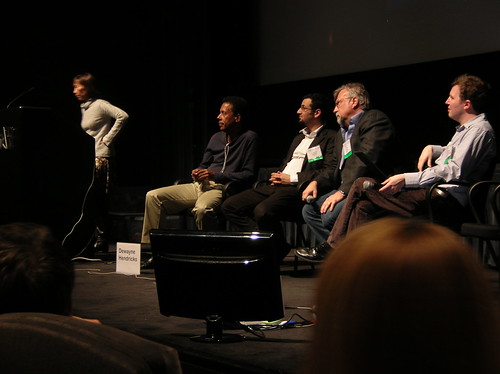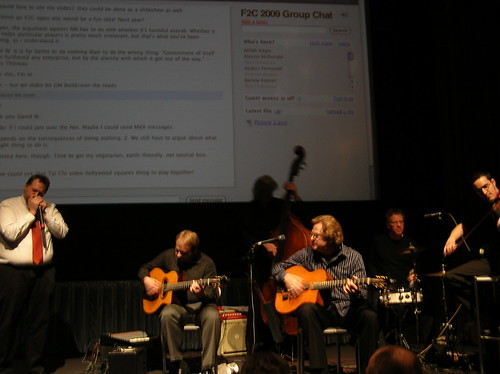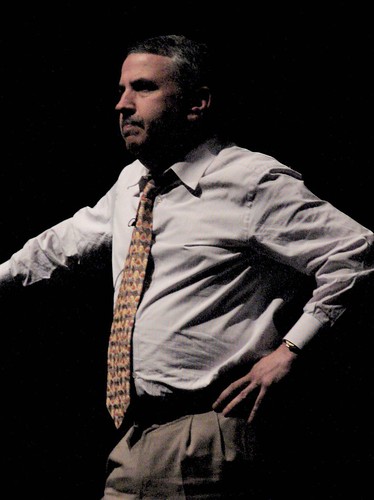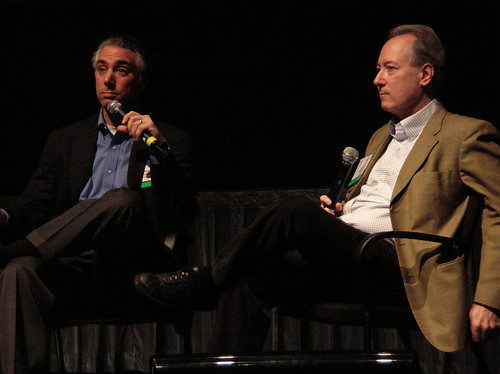News organizations rarely cover the theological conferences I attend, and even my tech conferences usually get only a passing glance from the media (We Magazine excepted).But for good reason, some media outlets have paid attention to the Freedom To Connect conference this year.
This was a good, different year for F2C. The conference was more confident; the change in political administrations, the provision for support for broadband connectivity in the stimulus package, and success stories in Lafayette, Louisiana and in Glasgow, Kentucky all buoyed the spirits of the conference’s advocates for extending high-speed access to the internet. A greater proportion of attendees wore suits, and the proportion wearing geek couture was lower — too bad, in many ways, but a sign of a kind of progress. The conference connectivity was superb, powered by a new fiber optic connection at the venue. The John Jorgenson Quintet impressed everyone with brilliant gypsy jazz. The conference went marvelously. Years from now, I may be telling the holographic projections of my great-grandchildren that I was there.
Among all the exciting opportunities, swinging chords, and hot debates over fiber vs. wireless and public vs. private financing models, cane New York Times columnist and high-profile author Thomas Friedman. Friedman addressed the conference with what seemed to be a talking-points version of his latest book; he sometimes lapsed into talking down to one of the most technically- and scientifically-savvy audiences around (presumably, at points when his book simplifies concepts for easier reading). Much as I sympathize with Friedman’s urgent warning that catastrophic climate change will not wait around for us humans, I was unimpressed with his address more generally. And he lost significant marks when conference organizer relayed to Friedman a challenge from the projection screen’s chat channel, and Friedman first indicated his intent to not answer, then suggested that his questioner “be fruitful and multiply” (but not in those words, as Woody Allen said) .
That didn’t set well with the audience, and much back-and-forth has ensued. Should a prominent figure such as Friedman have been challenged at all? Should he be excused his profanity? Should the audience just chill out?
Dan Gillmor, who’ll be visiting Duke soon, speaks about the event from a long career in journalism. His conclusion sounds wise to me: “Saying ‘F*** y**’ didn’t make him more authoritative. It diminished him.”




AKMA, this is so rich.
First, I remain as utterly mystified as ever at what is achieved at these conferences, other than the expenditure of many equivalent barrels of oil and the subsequent release of the equivalent amounts of CO2, for the same people to utter the same opinions, or perhaps admire their presentation styles.
Second, despite the erroneous, or at best incomplete, assertion that “hyperlinks subvert hierarchy,” (hyperlinks sometimes subvert existing hierarchies, while establishing new ones – at best, they increase churn, which may be a good thing), the organizers invite and headline high attention-earners (“authorities”) to bloviate before their adoring (or “challenging”) masses. Since the internet makes the world “flat,” and hierarchy-free, then it seems to me that Friedman was within his egalitarian everyman rights, themselves cherished and promoted by the anointed and sainted Dan Gillmor, to share a “flat,” idiomatic colloquialism in response to what was probably, as we readers don’t know because you didn’t share the question, a churlish attempt to embarrass Mr. Friedman. Because that’s how we roll, we neterati. Unimpressed as we are with “authority,” both real and imagined.
Anyway, you gotta love the human nature of it all! Hope you made some good contacts in your quest for new work.
And while I remain mystified regarding the whole “conference” thing, you do have my continuing best wishes for success in employment. Net-net, (nyuk-nyuk) you’re one of the “good” things about the web.